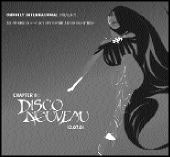If you are reading this on Wednesday, Feb. 27, stop right now and get your ass over to the Baltic Room. Why the urgency? Because ROBO.trash—the club’s new “weekly experiment” of electronic grooves from, and inspired by, the ’80s—is hosting a special appearance by techno DJ-producer John Selway. If you’re one of those savvy children of the Reagan-Bush era who is sick to death of ’80s nights where idiotic crap like “Mickey” trumps the classics of Cabaret Voltaire and Yello, this special evening promises to validate your enduring good taste.
Selway is playing in support of the forthcoming Tangent 2002: Disco Nouveau (on Ghostly International), “a compendium of the robot disco sound as seen through the eyes of 14 contemporary electronic musicians.” Along with Selway, underground notables like Adult, Susumu Yokota (whose oddball Grinning Cat was one of last year’s finest full-lengths), electro-renegades DMX Krew, and former Balihu Records mastermind Danny Wang deliver new cuts that pick up where disco innovators like Giorgio Moroder and Cerrone left off two decades ago.
Released under his Memory Boy moniker, Selway contributes a moody tune titled “There Is No Electricity.” Fans who know the New Yorker for his pumping techno and electro tracks may be initially surprised by this moody tune. In England, one reviewer recently alleged that Selway was “haunted” by the ghost of Joy Division’s suicidal singer Ian Curtis. “I didn’t realize I was so depressed. I’m generally happy, but I guess that song came out a little darker. I was going through a rough patch with my girlfriend, and ‘There Is No Electricity’ is a metaphor for what was going on at the time.”
Although “There Is No Electricity” owes an obvious debt to new wave, its other key inspiration—and Selway’s current obsession—is less widely known: Italo-disco. If that term summons up Saturday Night Fever-style images of swarthy Brooklyn lotharios in white polyester suits and braided gold chains glistening through chest hair, think again.
Even as the rest of the world was busy burning its Donna Summer albums in the early ’80s, disco continued going strong in the Mediterranean. And while much of it was pure mozzarella, with the advent of cheap synthesizers, a particular strain of Italian disco began to mutate into a stripped-down sound that would directly influence the early producers of house and techno in Chicago and Detroit. (For a sample, check out the unquestionable classic of the Italo-disco genre, 1982’s “Dirty Talk” by Klein + M.B.O., featured on Volume 3 of Tommy Boy Records’ The Perfect Beats series.)
Selway’s preoccupation with Italo- disco grew out of a desire to learn more about the roots of the music he makes today. In his teens, before he began making a name for himself in the Washington, D.C., area (he shares writing and production credits on the first track released on the seminal Deep Dish label, 1992’s “A Feeling”), Selway was already soaking up the blips and bleeps of New Order and Kraftwerk, which a friend’s father had turned him on to.
“I remember in the early ’80s, every time there was a news story on personal computers, they would play Kraftwerk in the background,” he chuckles. “You’d hear ‘Computer World’ on the television all the time.”
As exceptional as the material on Disco Nouveau may be, it is hardly unprecedented. The past couple of years have witnessed the rise of a whole crop of artists paying homage to club grooves of yore: Fischerspooner (Selway remixed their breakout, “Emerge”), Crossover, Chicks on Speed, Playgroup, and Miss Kittin. Selway isn’t the least bit surprised by this renewed interest in days-of-futurism past. “The last time electronic and dance mixed together in a popular way was in the early ’80s,” he reflects. “Even when disco wasn’t cool, people still wanted to dance. Duran Duran turned Middle America on to art and fashion mixed with music. It makes sense that it’d come back now, because dance music is as big as ever worldwide.”
So while Selway’s next release, the mid-March Journeys by DJ mix CD Lightwave, promises to be much more forward-looking and progressive, for the duration of the Disco Nouveau tour he’s stepping back in time. “I’ll play some new stuff, too,” he promises, “but I like playing the records that are the influence for the people who made Disco Nouveau. I want people to hear this stuff.”
“Some of the original Italo stuff, as cool as it is, is pretty silly,” he admits. “I’ve got covers of ‘Tequila’ and ‘Smoke on the Water’ done with modular synthesizers and drum machines, and the Italo-disco version of Iron Butterfly, ‘In-A-Gadda-Da-Vida,’ complete with robot vocals.” Silly or not, it beats hearing Toni Basil and those goddamn cheerleaders one more time.






